Unit 1 The written world grammar and usage
文档属性
| 名称 | Unit 1 The written world grammar and usage |
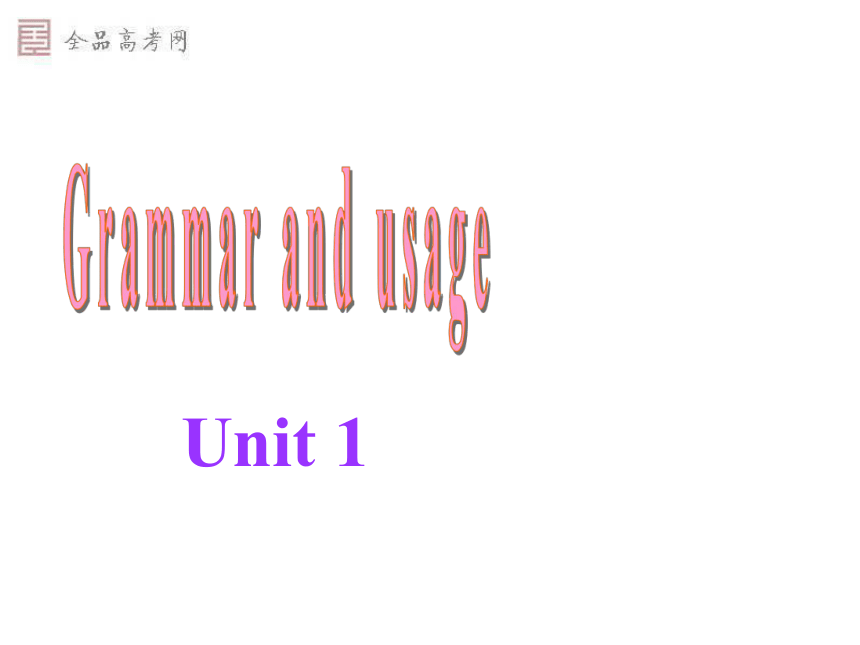
|
|
| 格式 | rar | ||
| 文件大小 | 328.4KB | ||
| 资源类型 | 教案 | ||
| 版本资源 | 牛津译林版 | ||
| 科目 | 英语 | ||
| 更新时间 | 2010-09-23 00:00:00 | ||
图片预览

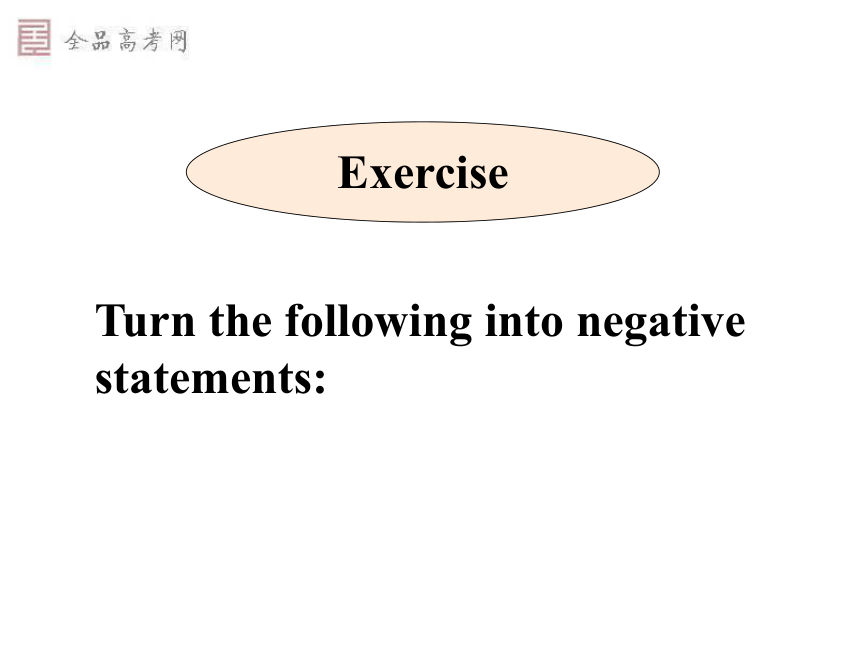
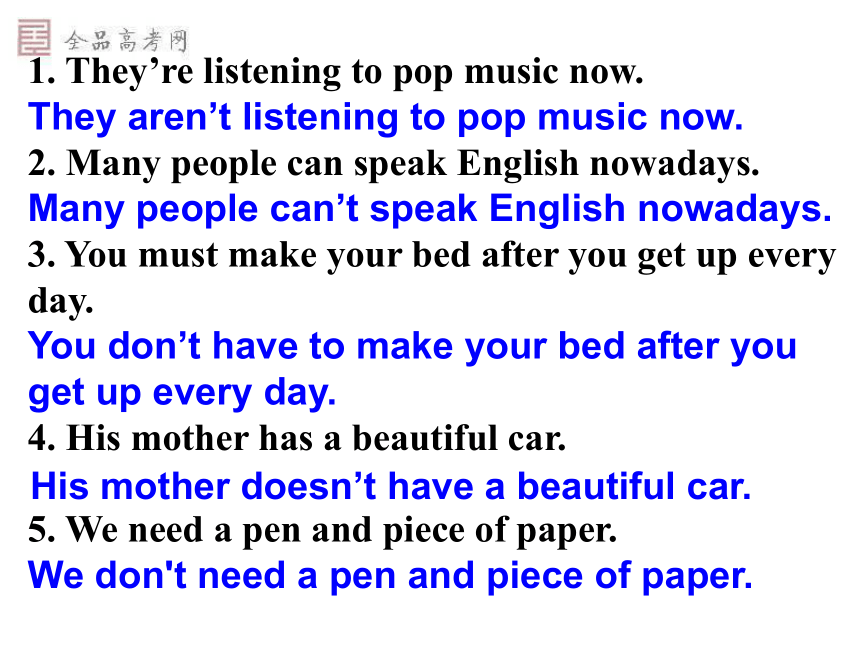
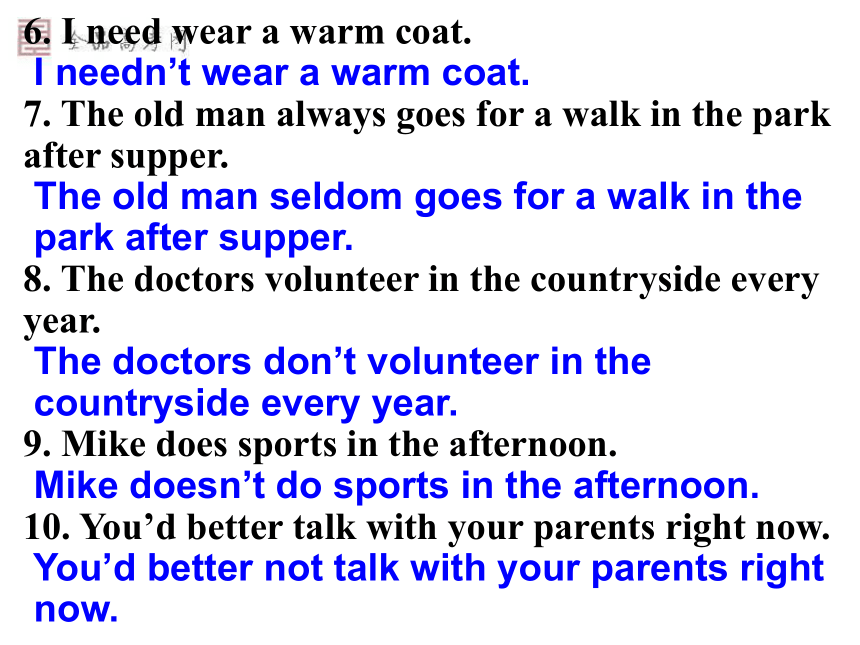
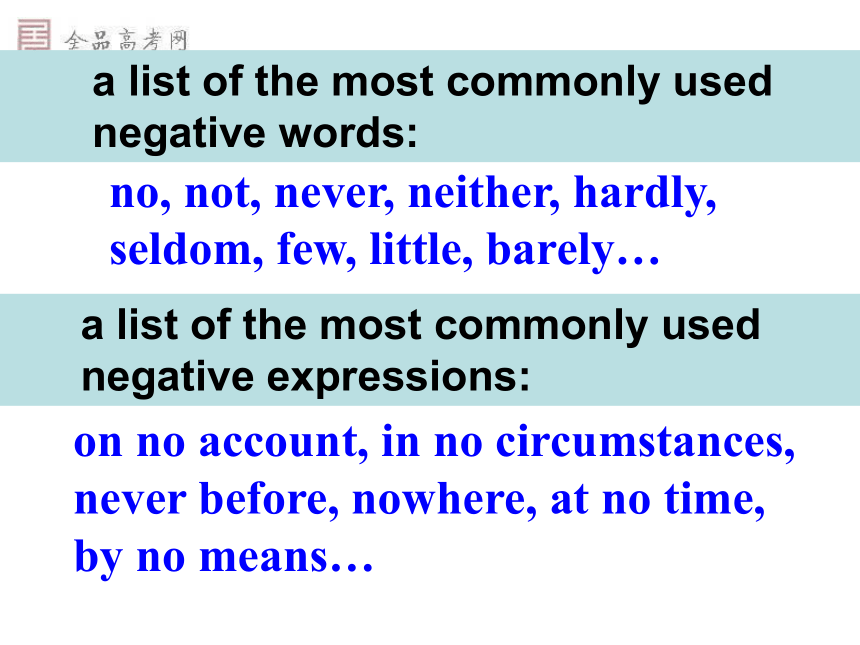
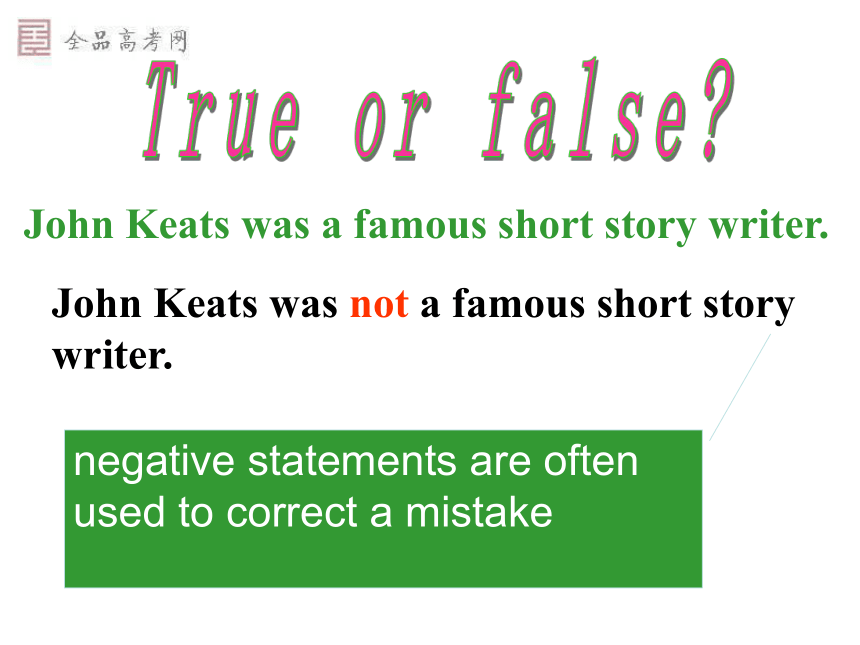


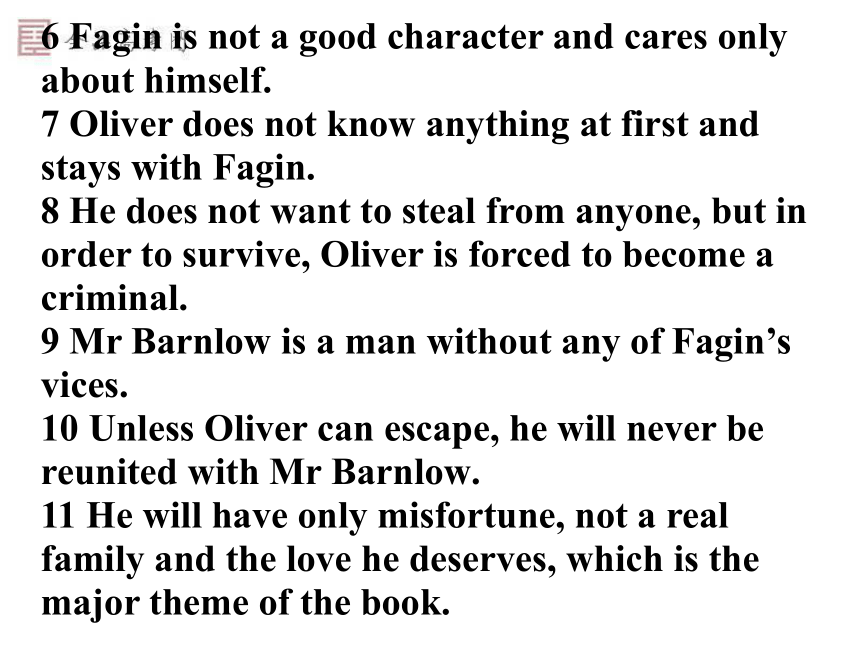
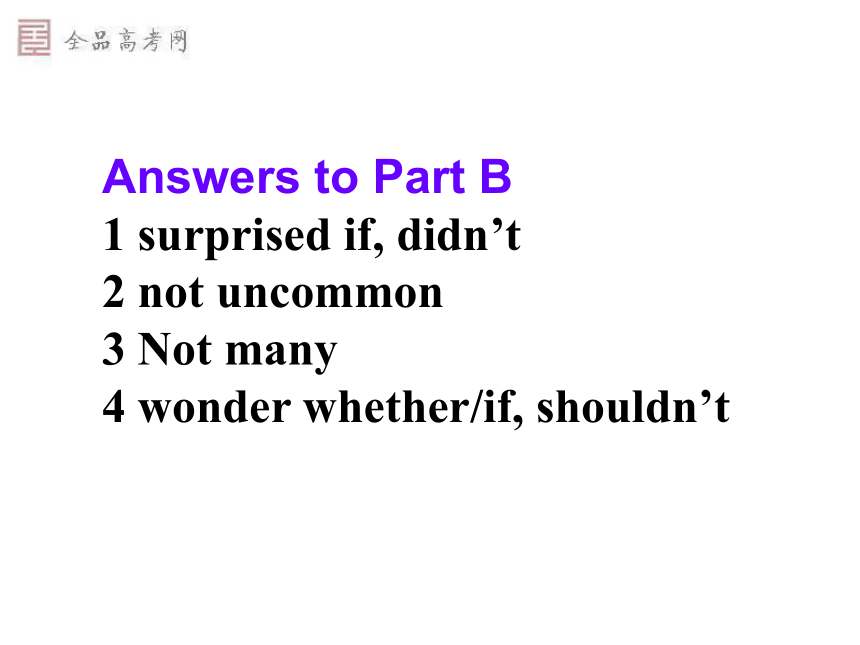
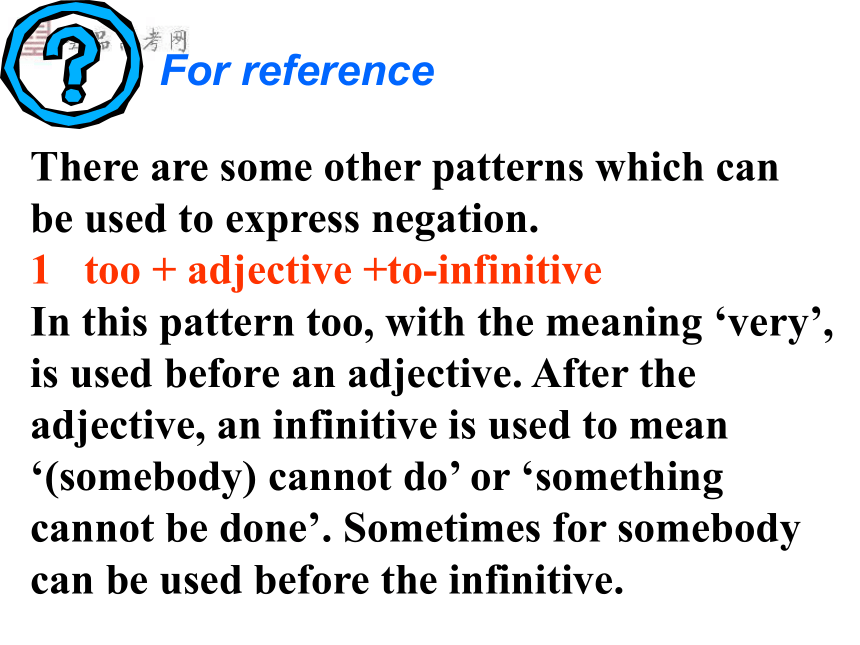
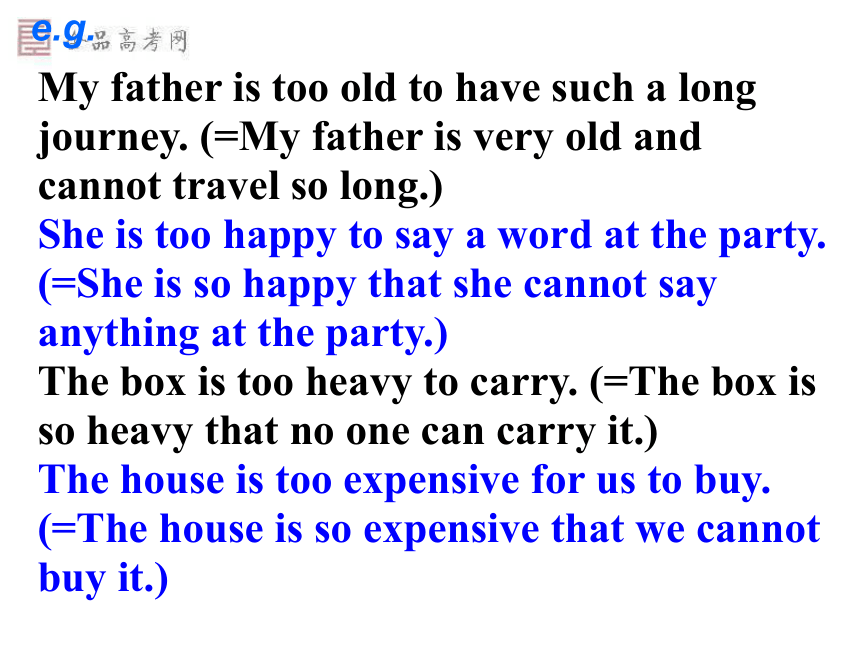
文档简介
课件59张PPT。Grammar and usageUnit 1Turn the following into negative statements:Exercise1. They’re listening to pop music now.
They aren’t listening to pop music now.
2. Many people can speak English nowadays.
Many people can’t speak English nowadays.
3. You must make your bed after you get up every
day.
You don’t have to make your bed after you
get up every day.
4. His mother has a beautiful car.
5. We need a pen and piece of paper.
We don't need a pen and piece of paper. His mother doesn’t have a beautiful car.6. I need wear a warm coat.
I needn’t wear a warm coat.
7. The old man always goes for a walk in the park after supper.
The old man seldom goes for a walk in the
park after supper.
8. The doctors volunteer in the countryside every year.
The doctors don’t volunteer in the
countryside every year.
9. Mike does sports in the afternoon.
Mike doesn’t do sports in the afternoon.
10. You’d better talk with your parents right now.
You’d better not talk with your parents right
now. a list of the most commonly used
negative words:no, not, never, neither, hardly, seldom, few, little, barely… a list of the most commonly used
negative expressions:on no account, in no circumstances, never before, nowhere, at no time, by no means…True or false? John Keats was a famous short story writer. John Keats was not a famous short story writer.negative statements are often used to correct a mistake Read a book report written by Sharon. Try to cycle the negative statements.Answers
A 1 …he experiences an abnormal childhood without any parents.
2 He is raised in a place with other children who also have no parents.
3 He is then sent to a workhouse, where he has to work very hard and hardly has time to relax.
4 Oliver does not like anything about the workhouse.
5 He is treated very badly and seldom has enough food or water.
6 Fagin is not a good character and cares only about himself.
7 Oliver does not know anything at first and stays with Fagin.
8 He does not want to steal from anyone, but in order to survive, Oliver is forced to become a criminal.
9 Mr Barnlow is a man without any of Fagin’s vices.
10 Unless Oliver can escape, he will never be reunited with Mr Barnlow.
11 He will have only misfortune, not a real family and the love he deserves, which is the major theme of the book. Answers to Part B
1 surprised if, didn’t
2 not uncommon
3 Not many
4 wonder whether/if, shouldn’t For reference
There are some other patterns which can be used to express negation.
1 too + adjective +to-infinitive
In this pattern too, with the meaning ‘very’, is used before an adjective. After the adjective, an infinitive is used to mean ‘(somebody) cannot do’ or ‘something cannot be done’. Sometimes for somebody can be used before the infinitive. e.g.
My father is too old to have such a long journey. (=My father is very old and cannot travel so long.)
She is too happy to say a word at the party. (=She is so happy that she cannot say anything at the party.)
The box is too heavy to carry. (=The box is so heavy that no one can carry it.)
The house is too expensive for us to buy. (=The house is so expensive that we cannot buy it.)
2 few + a countable noun; little +an uncountable noun
When we use few to modify a countable noun, we mean ‘not many’, and the noun should be in its plural form. When we use little to modify an uncountable noun, we mean ‘not much’. And few or little here has the negative meaning. e.g.
Few students in our class have ever read Katherine Mansfield’s short stories. (=Not many/Only one or two students in our class have ever read Katherine Mansfield's short stories.)
We have little rain all this summer. (=It almost does not rain during this summer.)
Because few or little has the negative meaning, we do not use the negative form in question tags.
e.g.
Few people liked his painting at that time, did they?
There is little ink in the bottle, is there? Consolidation 1. [2007 全国II] If Joe’s wife won’t go to the party, ____.
A. he will either B. neither will he
C. he neither will D. either he will
2. [2007 福建]
—Do you need any help, Lucy?
—Yes, The job is I could do myself.
A. less than B. more than
C. no more than D. not more than I. Multiple choice3. His mother had talked to him for many minutes while he was watching TV, but ____. A. a little did he hear B. little did he hear C. little heard he D. a little heard he 4. During the war, ____but also he lost his wife and his child. A. not was his job in the lab taken away
B. not only was his job in the lab taken away C. not merely his job in the lab was taken away
D. not just was taken away his job in the lab 5. I think this is the first time that we have met. ___anywhere. A. Before have we never seen each other
B. Never before we have seen each other C. Each other have we seen never before
D. Never before have we seen each other 6. — The old man wouldn’t stay at home for a rest even if it rained. — ____. He would feel sick if he stayed home for one day. A. So would my grandpa
B. So wouldn’t my grandpa C. Neither would my grandpa
D. Nor wouldn’t my grandpa 7. By no means ___ to our plan for the trip. A. will she agree B. she will agree
C. agrees she D. will agree she 9. Henry often helps look after Granny Wang, but___. A. seldom is George
B. seldom George does C. seldom does George
D. seldom looks George after Granny Wang 10. Nothing but two ancient Chinese coins ______ after they took out the jar. A. did they find in it B. they found in it
C. in it did they find D. in it found they II. Translation
1. 这两本书都不是英国出版的。 2. 你们当中我一个也不认识。3. 我不同意所有这些方案。1. Neither of the books is published in England.
2. I know none of you.
3. I agree to none of these plans. 4. We had finished all the work before he came.
5. How imperfect the rules and regulations are!
6. Nobody can come in without permission. 4. 在他还没来之前,我们就把所有的工作都做完了。
5. 这些规章制度多不完善!
6. 未经允许,任何人不得入内。7. 听到这个消息后,没有一个人不感到惊奇。
8. 人们直到失去了健康才知道健康的可贵。
9. 直到五月的一个星期六下午,玛格丽特才安排我与她姐姐见面。7. Having heard the news, everybody felt
surprised.
There was nobody who did not feel surprised.
There was nobody but felt surprised.
8. People do not know the blessing of health until they lose it.
9. It was not until a Saturday afternoon in May that Margaret could arrange for me to meet her elder sister.10. 不久他就告诉了我们这件事。
11. 对他的成绩我们怎么赞扬也不过分。
12. 他刚进办公室,电话铃就响了。10. It wasn’t long before he told us about this affair.
11. We can hardly praise his achievement too much.
12. No sooner had he entered the office than the telephone rang.13. 只有傻瓜才会做这种事情。
14. 她是班里最自私的了。
15. 他的失败完全是由于他自己的粗心大意。13. None but a fool would do such a thing.
14. Nobody is more selfish than her in the class.
15. His failure was due to nothing else than his own carelessness. Language points1. serve (P8)
verb [T] 服务,接待
That’s the restaurant where they refused to serve Giles because he was so rude.
提供食物,饮料等
Do they serve meals in the bar?
serve 提供所需之物
London’s hospitals, so says the report, are out of touch with the communities that they serve.
服务,工作,服役
He served in the army in India for twenty years.
She has served on the committee for the last fifteen years.
He served under Harold Wilson as Transport Minister. service ? noun [U] 服务,接待
The only trouble with this café is that the service is so slow.
[C] 公用事业
the ambulance/health/postal/prison service. servant ?? n. 公务员
Public servants should be incorruptible.
in service 在使用
The battleship has been in service since 1965. 1. (2007天津)
A new ________ bus service to Tianjin Airport started to operate two months ago.
A. normal B. usual
C. regular D. common 高考链接2. My friend, who ______ on the International Olympic Committee all his life, is retiring next month. (2006 浙江)
A. served B. is serving
C. had served D. has served
3. If you are feeling so tired, perhaps a little sleep would _____. (2004 浙江)
A. act B. help C. serve D. last
高考链接2. raise (P9)
verb [T] 1) 抚养
Her parents died when she was a baby and she was raised by her grandparents.
The farmer raises (= breeds) chickens and pigs.
The soil around here isn't good enough for raising (= growing) crops.
2) 抬高, 提高
I had to raise my voice (= speak more loudly) to make myself heard over the noise.
Our little chat has raised my spirits (= made me feel happier).
3) 举起
Would all those in favor please raise their hands?3. abuse (P9)
verb [T] 虐待
She is continually abusing her position/authority by getting other people to do things for her.
辱骂
The crowd started abusing him after he failed to save a goal. abuse noun [U] 辱骂
He hurled (a stream/torrent of) abuse at her (= He said a lot of rude and offensive things to her).
child abuse noun [U] 虐待儿童
4. get caught (P9)
get + done
I got shouted at by some idiot for walking past his house.
They’re getting married later this year.
This window seems to have got broken.1. (2007北京)
I got caught in the rain and my suit____.
has ruined B. had ruined
C. has been ruined D. had been ruined
2. (2003 北京)
-_______ David and Vicky _______married?
-For about three years.
A.How long were … being
B.How long have … got
C.How long have … been
D.How long did … get
高考链接
3. (2002 全国春)
— How are the team playing?
— They're playing well, but one of them _______ hurt.
A. got B. gets C. are D. were
4. (2001 全国)
As we joined the big crowd I got ______ from my friends.
A. separated B. spared C. lost D. missed
高考链接5. pressure (P9) n/v
put pressure on 对…施压
under the pressure of 在…的压力下Life is tough in the city. In order to lose their ______, some people drink alcohol. (2003 上海)
A. temper B. mood
C. consciousness D. pressures
高考链接6. threat (P9)
noun [C] 威胁
Drunken drivers pose a serious threat (= cause a lot of harm) to other road users.
be under threat of sth. 在……的威胁之下
She left the country under threat of arrest if she returned.威胁
They threatened the shopkeeper with a gun.
[+ to infinitive] They threatened to kill him unless he did as they asked.threaten vt crime n.犯罪
commit a crime犯罪
crime prevention预防犯罪
crime rate犯罪率Her brother _____ to leave her in the dark room alone when she disobeyed his order. (2001 上海)
A. declared B. threatened
C. warned D. exclaimed
高考链接 shade n. 遮了光的”阴凉处”
shadow n. 无光的”阴暗处”
(shadows; shade)
Let’s go to the ____ under the tree to cool off.
Thieves like to hide themselves in ____.
P102 C1
1. I can hardly study long hours when I have a cold.
2. His father cannot taste the food unless it is this salty.
3.The woman is now free from the disease.
4. Many people thought that the music was not too loud.
5. The boy never goes to bed early. P102 C1
6. She didn’t want to drink coffee or lemonade.
7. I seldom surf the Internet at night.
8. Todd did not say he might join us for dinner.
9. Few people witnessed the incident.
10. Lucy does not want to go to see the film this weekend. P100 A1
1. classical classics
2. dusty dust
3. work works
4. uncertain uncertainty
5. tense tensionP100 A1
6. prejudice prejudiced
7. adapted adaptation
8. Finance financial
P100 A2
move to
be different from
2. have nothing to do with
3. an example of
be native to
be used in
5. make into
6. add to
7. set sb free from sth
8. be good toP101 B1
typical
2. shorten
3. comparison
4. exhibition
5. spelling
6. mourned
7. stressed
8. intendedP101 B2
reputation
2. unban
3. transformed
4.debts
5. nationwide
6. dreamlike
7. earned her living
8. donated
9. statue
10. overnight
gain/make/earn a living by doing sth
earn one’s living by doing sthP103 D1
settled
urban
reputation
exhibition
intend
novelist
rigid
mistaken
acquaintance
tressedP17 同步辅导
1. She would rather sing that English song.
2. Where we will have the meeting is not clear.
3. He got burnt while putting out the fire.
4. It’s too late. Let’s get doing.
5. I’d rather you hadn’t done that.P19 同步辅导
1. Not all people are willing to live on this island.
2. I have never seen such a beautiful picture.
3. 我现在必须走了,我等不及要见他了.
4. 没有艰辛就没有成功
5. 他一到就开始报怨.P19 同步辅导
1. Mary will not go to Beijing this weekend.
2. He seldom plays computer in the summer holidays.
3. She can hardly work hard when she is too week.
4. He didn’t get into an accident uesterday after work.
5. Lily doesn’t want to go the Great Wall with her mother this summer.
They aren’t listening to pop music now.
2. Many people can speak English nowadays.
Many people can’t speak English nowadays.
3. You must make your bed after you get up every
day.
You don’t have to make your bed after you
get up every day.
4. His mother has a beautiful car.
5. We need a pen and piece of paper.
We don't need a pen and piece of paper. His mother doesn’t have a beautiful car.6. I need wear a warm coat.
I needn’t wear a warm coat.
7. The old man always goes for a walk in the park after supper.
The old man seldom goes for a walk in the
park after supper.
8. The doctors volunteer in the countryside every year.
The doctors don’t volunteer in the
countryside every year.
9. Mike does sports in the afternoon.
Mike doesn’t do sports in the afternoon.
10. You’d better talk with your parents right now.
You’d better not talk with your parents right
now. a list of the most commonly used
negative words:no, not, never, neither, hardly, seldom, few, little, barely… a list of the most commonly used
negative expressions:on no account, in no circumstances, never before, nowhere, at no time, by no means…True or false? John Keats was a famous short story writer. John Keats was not a famous short story writer.negative statements are often used to correct a mistake Read a book report written by Sharon. Try to cycle the negative statements.Answers
A 1 …he experiences an abnormal childhood without any parents.
2 He is raised in a place with other children who also have no parents.
3 He is then sent to a workhouse, where he has to work very hard and hardly has time to relax.
4 Oliver does not like anything about the workhouse.
5 He is treated very badly and seldom has enough food or water.
6 Fagin is not a good character and cares only about himself.
7 Oliver does not know anything at first and stays with Fagin.
8 He does not want to steal from anyone, but in order to survive, Oliver is forced to become a criminal.
9 Mr Barnlow is a man without any of Fagin’s vices.
10 Unless Oliver can escape, he will never be reunited with Mr Barnlow.
11 He will have only misfortune, not a real family and the love he deserves, which is the major theme of the book. Answers to Part B
1 surprised if, didn’t
2 not uncommon
3 Not many
4 wonder whether/if, shouldn’t For reference
There are some other patterns which can be used to express negation.
1 too + adjective +to-infinitive
In this pattern too, with the meaning ‘very’, is used before an adjective. After the adjective, an infinitive is used to mean ‘(somebody) cannot do’ or ‘something cannot be done’. Sometimes for somebody can be used before the infinitive. e.g.
My father is too old to have such a long journey. (=My father is very old and cannot travel so long.)
She is too happy to say a word at the party. (=She is so happy that she cannot say anything at the party.)
The box is too heavy to carry. (=The box is so heavy that no one can carry it.)
The house is too expensive for us to buy. (=The house is so expensive that we cannot buy it.)
2 few + a countable noun; little +an uncountable noun
When we use few to modify a countable noun, we mean ‘not many’, and the noun should be in its plural form. When we use little to modify an uncountable noun, we mean ‘not much’. And few or little here has the negative meaning. e.g.
Few students in our class have ever read Katherine Mansfield’s short stories. (=Not many/Only one or two students in our class have ever read Katherine Mansfield's short stories.)
We have little rain all this summer. (=It almost does not rain during this summer.)
Because few or little has the negative meaning, we do not use the negative form in question tags.
e.g.
Few people liked his painting at that time, did they?
There is little ink in the bottle, is there? Consolidation 1. [2007 全国II] If Joe’s wife won’t go to the party, ____.
A. he will either B. neither will he
C. he neither will D. either he will
2. [2007 福建]
—Do you need any help, Lucy?
—Yes, The job is I could do myself.
A. less than B. more than
C. no more than D. not more than I. Multiple choice3. His mother had talked to him for many minutes while he was watching TV, but ____. A. a little did he hear B. little did he hear C. little heard he D. a little heard he 4. During the war, ____but also he lost his wife and his child. A. not was his job in the lab taken away
B. not only was his job in the lab taken away C. not merely his job in the lab was taken away
D. not just was taken away his job in the lab 5. I think this is the first time that we have met. ___anywhere. A. Before have we never seen each other
B. Never before we have seen each other C. Each other have we seen never before
D. Never before have we seen each other 6. — The old man wouldn’t stay at home for a rest even if it rained. — ____. He would feel sick if he stayed home for one day. A. So would my grandpa
B. So wouldn’t my grandpa C. Neither would my grandpa
D. Nor wouldn’t my grandpa 7. By no means ___ to our plan for the trip. A. will she agree B. she will agree
C. agrees she D. will agree she 9. Henry often helps look after Granny Wang, but___. A. seldom is George
B. seldom George does C. seldom does George
D. seldom looks George after Granny Wang 10. Nothing but two ancient Chinese coins ______ after they took out the jar. A. did they find in it B. they found in it
C. in it did they find D. in it found they II. Translation
1. 这两本书都不是英国出版的。 2. 你们当中我一个也不认识。3. 我不同意所有这些方案。1. Neither of the books is published in England.
2. I know none of you.
3. I agree to none of these plans. 4. We had finished all the work before he came.
5. How imperfect the rules and regulations are!
6. Nobody can come in without permission. 4. 在他还没来之前,我们就把所有的工作都做完了。
5. 这些规章制度多不完善!
6. 未经允许,任何人不得入内。7. 听到这个消息后,没有一个人不感到惊奇。
8. 人们直到失去了健康才知道健康的可贵。
9. 直到五月的一个星期六下午,玛格丽特才安排我与她姐姐见面。7. Having heard the news, everybody felt
surprised.
There was nobody who did not feel surprised.
There was nobody but felt surprised.
8. People do not know the blessing of health until they lose it.
9. It was not until a Saturday afternoon in May that Margaret could arrange for me to meet her elder sister.10. 不久他就告诉了我们这件事。
11. 对他的成绩我们怎么赞扬也不过分。
12. 他刚进办公室,电话铃就响了。10. It wasn’t long before he told us about this affair.
11. We can hardly praise his achievement too much.
12. No sooner had he entered the office than the telephone rang.13. 只有傻瓜才会做这种事情。
14. 她是班里最自私的了。
15. 他的失败完全是由于他自己的粗心大意。13. None but a fool would do such a thing.
14. Nobody is more selfish than her in the class.
15. His failure was due to nothing else than his own carelessness. Language points1. serve (P8)
verb [T] 服务,接待
That’s the restaurant where they refused to serve Giles because he was so rude.
提供食物,饮料等
Do they serve meals in the bar?
serve 提供所需之物
London’s hospitals, so says the report, are out of touch with the communities that they serve.
服务,工作,服役
He served in the army in India for twenty years.
She has served on the committee for the last fifteen years.
He served under Harold Wilson as Transport Minister. service ? noun [U] 服务,接待
The only trouble with this café is that the service is so slow.
[C] 公用事业
the ambulance/health/postal/prison service. servant ?? n. 公务员
Public servants should be incorruptible.
in service 在使用
The battleship has been in service since 1965. 1. (2007天津)
A new ________ bus service to Tianjin Airport started to operate two months ago.
A. normal B. usual
C. regular D. common 高考链接2. My friend, who ______ on the International Olympic Committee all his life, is retiring next month. (2006 浙江)
A. served B. is serving
C. had served D. has served
3. If you are feeling so tired, perhaps a little sleep would _____. (2004 浙江)
A. act B. help C. serve D. last
高考链接2. raise (P9)
verb [T] 1) 抚养
Her parents died when she was a baby and she was raised by her grandparents.
The farmer raises (= breeds) chickens and pigs.
The soil around here isn't good enough for raising (= growing) crops.
2) 抬高, 提高
I had to raise my voice (= speak more loudly) to make myself heard over the noise.
Our little chat has raised my spirits (= made me feel happier).
3) 举起
Would all those in favor please raise their hands?3. abuse (P9)
verb [T] 虐待
She is continually abusing her position/authority by getting other people to do things for her.
辱骂
The crowd started abusing him after he failed to save a goal. abuse noun [U] 辱骂
He hurled (a stream/torrent of) abuse at her (= He said a lot of rude and offensive things to her).
child abuse noun [U] 虐待儿童
4. get caught (P9)
get + done
I got shouted at by some idiot for walking past his house.
They’re getting married later this year.
This window seems to have got broken.1. (2007北京)
I got caught in the rain and my suit____.
has ruined B. had ruined
C. has been ruined D. had been ruined
2. (2003 北京)
-_______ David and Vicky _______married?
-For about three years.
A.How long were … being
B.How long have … got
C.How long have … been
D.How long did … get
高考链接
3. (2002 全国春)
— How are the team playing?
— They're playing well, but one of them _______ hurt.
A. got B. gets C. are D. were
4. (2001 全国)
As we joined the big crowd I got ______ from my friends.
A. separated B. spared C. lost D. missed
高考链接5. pressure (P9) n/v
put pressure on 对…施压
under the pressure of 在…的压力下Life is tough in the city. In order to lose their ______, some people drink alcohol. (2003 上海)
A. temper B. mood
C. consciousness D. pressures
高考链接6. threat (P9)
noun [C] 威胁
Drunken drivers pose a serious threat (= cause a lot of harm) to other road users.
be under threat of sth. 在……的威胁之下
She left the country under threat of arrest if she returned.威胁
They threatened the shopkeeper with a gun.
[+ to infinitive] They threatened to kill him unless he did as they asked.threaten vt crime n.犯罪
commit a crime犯罪
crime prevention预防犯罪
crime rate犯罪率Her brother _____ to leave her in the dark room alone when she disobeyed his order. (2001 上海)
A. declared B. threatened
C. warned D. exclaimed
高考链接 shade n. 遮了光的”阴凉处”
shadow n. 无光的”阴暗处”
(shadows; shade)
Let’s go to the ____ under the tree to cool off.
Thieves like to hide themselves in ____.
P102 C1
1. I can hardly study long hours when I have a cold.
2. His father cannot taste the food unless it is this salty.
3.The woman is now free from the disease.
4. Many people thought that the music was not too loud.
5. The boy never goes to bed early. P102 C1
6. She didn’t want to drink coffee or lemonade.
7. I seldom surf the Internet at night.
8. Todd did not say he might join us for dinner.
9. Few people witnessed the incident.
10. Lucy does not want to go to see the film this weekend. P100 A1
1. classical classics
2. dusty dust
3. work works
4. uncertain uncertainty
5. tense tensionP100 A1
6. prejudice prejudiced
7. adapted adaptation
8. Finance financial
P100 A2
move to
be different from
2. have nothing to do with
3. an example of
be native to
be used in
5. make into
6. add to
7. set sb free from sth
8. be good toP101 B1
typical
2. shorten
3. comparison
4. exhibition
5. spelling
6. mourned
7. stressed
8. intendedP101 B2
reputation
2. unban
3. transformed
4.debts
5. nationwide
6. dreamlike
7. earned her living
8. donated
9. statue
10. overnight
gain/make/earn a living by doing sth
earn one’s living by doing sthP103 D1
settled
urban
reputation
exhibition
intend
novelist
rigid
mistaken
acquaintance
tressedP17 同步辅导
1. She would rather sing that English song.
2. Where we will have the meeting is not clear.
3. He got burnt while putting out the fire.
4. It’s too late. Let’s get doing.
5. I’d rather you hadn’t done that.P19 同步辅导
1. Not all people are willing to live on this island.
2. I have never seen such a beautiful picture.
3. 我现在必须走了,我等不及要见他了.
4. 没有艰辛就没有成功
5. 他一到就开始报怨.P19 同步辅导
1. Mary will not go to Beijing this weekend.
2. He seldom plays computer in the summer holidays.
3. She can hardly work hard when she is too week.
4. He didn’t get into an accident uesterday after work.
5. Lily doesn’t want to go the Great Wall with her mother this summer.
